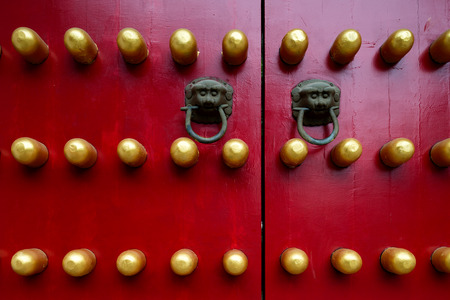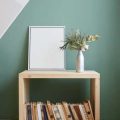1. Understanding Feng Shui and Mirrors
Feng Shui, pronounced “fung shway,” is an ancient Chinese practice that focuses on harmonizing individuals with their environment to attract positive energy, or “chi.” In American homes, Feng Shui is gaining popularity as people look for ways to create a welcoming and prosperous atmosphere. One of the most common elements used in Feng Shui is the mirror. But why are mirrors so important, and what role do they play near your front door?
What Is Feng Shui?
Feng Shui is all about arranging your living space to promote health, happiness, and prosperity. It’s based on the idea that everything around us has energy, and by balancing this energy, we can improve our lives. Many Americans enjoy adding Feng Shui touches to their homes to create a peaceful vibe and maybe even boost their luck.
The Power of Mirrors in Feng Shui
Mirrors aren’t just for checking your outfit—they’re also powerful tools in Feng Shui. Traditionally, mirrors are believed to reflect energy. Depending on where you place them, they can invite good fortune or accidentally push it away. This belief has shaped how people use mirrors in their homes for centuries.
Traditional Beliefs About Mirrors
| Placement | Belief/Effect |
|---|---|
| Facing the front door | Might reflect positive energy out, causing loss of good fortune |
| In the dining room | Doubles abundance (food, wealth), inviting prosperity |
| Opposite clutter or mess | Amplifies negative energy or chaos in the home |
| Near natural light sources | Brings brightness and uplifting energy into the space |
Why Does Placement Matter?
The way you position a mirror can influence how chi flows through your home. For example, some believe that putting a mirror directly across from your front door might bounce good luck right back outside—while others use mirrors to visually expand spaces and brighten dark corners. Understanding these principles helps homeowners make choices that feel right for their space.
2. The Significance of the Front Door in American Homes
In the United States, the front door is more than just an entryway; it’s a symbol deeply woven into the fabric of everyday life. Americans often see the front door as the face of their home, reflecting personality, values, and even dreams. Let’s explore why the front door holds such cultural and practical importance across America.
The Front Door as a Symbol of Opportunity
In American culture, opportunity is a core value. The phrase “when one door closes, another opens” is widely used to express hope and new beginnings. Many people see their front door as the gateway to fresh possibilities—whether welcoming guests, celebrating holidays, or starting a new chapter in life. Real estate agents also emphasize curb appeal, knowing that a well-kept front door can make a powerful first impression on potential buyers.
Welcome and Hospitality
For many Americans, hospitality starts at the front door. Decorating porches with wreaths for Christmas or pumpkins for Halloween is a beloved tradition that signals warmth and friendliness to neighbors and visitors. The act of opening your front door to someone is seen as an invitation to share comfort and kindness—a gesture valued in communities big and small.
Ways Americans Use Their Front Door to Express Welcome
| Practice | Meaning |
|---|---|
| Seasonal Decorations | Shows holiday spirit and a welcoming attitude |
| Doormats with Greetings | Makes guests feel invited from the moment they arrive |
| Porch Lights | Adds security and signals readiness to receive visitors |
| Open House Events | Encourages community interaction and friendship |
The Front Door as a Symbol of Security
Security is another important aspect tied to the American front door. Homeowners invest in sturdy locks, smart doorbells, and outdoor lighting to protect their families and possessions. A secure front entrance gives peace of mind, showing that safety is a top priority while still being open to opportunities and connections.
Cultural Beliefs About the Front Door in America vs. Feng Shui Perspectives
| American Perspective | Feng Shui Perspective |
|---|---|
| Focus on curb appeal and security | Emphasis on energy flow (chi) entering through the main door |
| Decorate for holidays and personal expression | Avoid obstacles and clutter near entrance for good fortune |
| Use modern technology for safety (cameras, smart locks) | Select colors and placements based on elemental harmony |
The front door stands at the intersection of tradition, practicality, and belief—making it one of the most meaningful parts of any American home.
![]()
3. Mirrors Facing the Front Door: Myths and Meanings
When it comes to Feng Shui, few topics spark as much debate as the placement of mirrors near the front door. Some say it welcomes prosperity, while others warn it may send good fortune right back out. Let’s dive into what traditional Feng Shui says about this practice and how people in both Eastern and Western cultures interpret it today.
Traditional Feng Shui Advice
In classical Feng Shui, the front door is known as the “mouth of Qi” – it’s where energy enters your home. Placing a mirror directly opposite or facing the front door is often discouraged because:
- Bouncing Back Energy: It’s believed that a mirror here will reflect positive energy (Qi) right back outside, preventing it from circulating through your home.
- Restlessness: This setup can create a sense of instability or constant movement, making it hard for luck and wealth to “settle in.”
Eastern vs. Western Interpretations
| Perspective | View on Mirrors Facing Front Door | Common Practices |
|---|---|---|
| Eastern (Traditional Feng Shui) | Generally avoided; thought to push away prosperity and harmony. | Avoid direct reflection; place mirrors on side walls instead. |
| Western (Modern/Decorative) | Often used to create a sense of space and light, sometimes without considering energy flow. | Mirrors are placed for aesthetics or brightness; sometimes directly opposite the door. |
Cultural Adaptations in the US
In American homes, mirrors near the entryway are popular for practical reasons—checking appearance before heading out, or making a small foyer feel more open. However, if you want to blend good design with positive energy:
- Avoid direct alignment: Try not to place a mirror exactly facing the front door. Angling it or placing it on a side wall works better according to Feng Shui principles.
- Add intention: Choose mirrors with frames or designs that feel welcoming and warm, reinforcing positive vibes for anyone entering your home.
- Consider the view: If a mirror reflects something beautiful (like flowers or art), it can double up that positivity inside your house.
The Takeaway: Blending Traditions
Whether you’re following ancient wisdom or simply want a stylish entryway, understanding both perspectives can help you make choices that suit your lifestyle and beliefs. In short: be mindful of what your mirror reflects—and how it makes you feel when you walk through your front door!
4. Practical Mirror Placement Tips for American Households
Making the Most of Mirrors in Your Entryway
Mirrors can work wonders in entryways, but their placement is important. In American homes, the front door area often sets the tone for the entire house. Whether you have a classic foyer, a small mudroom, or an open-concept layout, following some simple guidelines can help you make the most of your mirrors without risking your good fortune.
Dos and Donts for Front Door Mirror Placement
| Do | Dont |
|---|---|
| Hang a mirror on a side wall to bounce light into the entryway | Place a mirror directly facing the front door (may reflect energy out) |
| Use mirrors to visually expand tight or dark entry spaces | Hang mirrors where they reflect clutter or shoes by the entrance |
| Select frames that match your home’s style (rustic, modern, etc.) | Choose overly large or heavy mirrors that feel imposing near the door |
| Keep mirrors clean and free of streaks to promote clarity and brightness | Let broken or cracked mirrors remain—replace them quickly! |
Where Should You Place Your Entryway Mirror?
- Side Walls: Hanging a mirror on either side of your front door is usually ideal. This lets you check your look before heading out and helps spread natural light throughout the space.
- Adjacent Rooms: If your entry opens directly into a living room or hallway, placing a mirror just inside those areas can create a sense of openness and flow.
- Avoid Direct Alignment: Try not to put mirrors so that they directly face the front door. Many believe this can reflect incoming positive energy right back outside instead of letting it fill your home.
Tips for Different Home Layouts
- Apartments/Condos: Use smaller mirrors on side walls to brighten up compact entryways without overwhelming the space.
- Larger Homes: Consider grouping several smaller mirrors together in an artistic arrangement to create visual interest while maximizing light.
- Mudrooms: Choose durable framed mirrors that can handle busy traffic and occasional bumps from backpacks or sports gear.
Bringing It All Together: Positive Vibes at Your Doorstep
The right mirror placement in your entryway doesn’t just look great—it can help invite more light, warmth, and positive energy into your home. By keeping these tips in mind and respecting both Feng Shui principles and American design sensibilities, you’ll create an inviting entrance for family and guests alike.
5. Balancing Tradition and Modern Living
In today’s homes, especially in the United States, many people want to honor cultural traditions like Feng Shui while also enjoying a modern lifestyle. When it comes to mirrors near the front door, it’s possible to blend age-old beliefs about prosperity with fresh, stylish interior design. Here are some practical ideas for integrating these concepts so you can create a welcoming and harmonious space.
Understanding the Beliefs
In Feng Shui, the placement of mirrors is important because they reflect energy (also called “chi”). Some traditional beliefs say that a mirror facing the front door can push good energy out, while others believe mirrors can invite abundance if used wisely. Balancing these ideas with your personal style is key.
Ways to Integrate Mirrors and Prosperity Beliefs
| Traditional Belief | Modern Design Solution |
|---|---|
| Avoid placing a mirror directly opposite the front door. | Hang the mirror on a side wall in your entryway to reflect light and create a sense of spaciousness without sending energy straight out the door. |
| Use mirrors to multiply positive images (like plants or artwork). | Position mirrors so they reflect beautiful elements, such as fresh flowers or inspiring art, instead of clutter or the front door itself. |
| Keep entryways tidy for good fortune. | Choose a decorative storage bench or sleek console table under a mirror to keep shoes, bags, and keys organized and visually appealing. |
| Select mirrors with rounded edges for softer energy flow. | Pick contemporary round or oval mirrors that match popular American interior trends while also supporting gentle energy movement. |
Tips for an Inviting Entryway
- Add welcoming touches: A rug with warm colors or a cheerful welcome sign helps set a positive tone right at your doorstep.
- Use lighting smartly: Wall sconces or pendant lights near your mirror can brighten the space and amplify uplifting energy.
- Personalize with intention: Include family photos, mementos, or meaningful symbols that represent happiness and success in your life.
Creating Harmony in Your Home
You don’t have to choose between tradition and modern style. By thoughtfully blending cultural beliefs about prosperity with contemporary design elements, you can enjoy an entryway—and an entire home—that feels both inviting and balanced. This approach allows you to respect ancient wisdom while expressing your own unique taste in décor.


